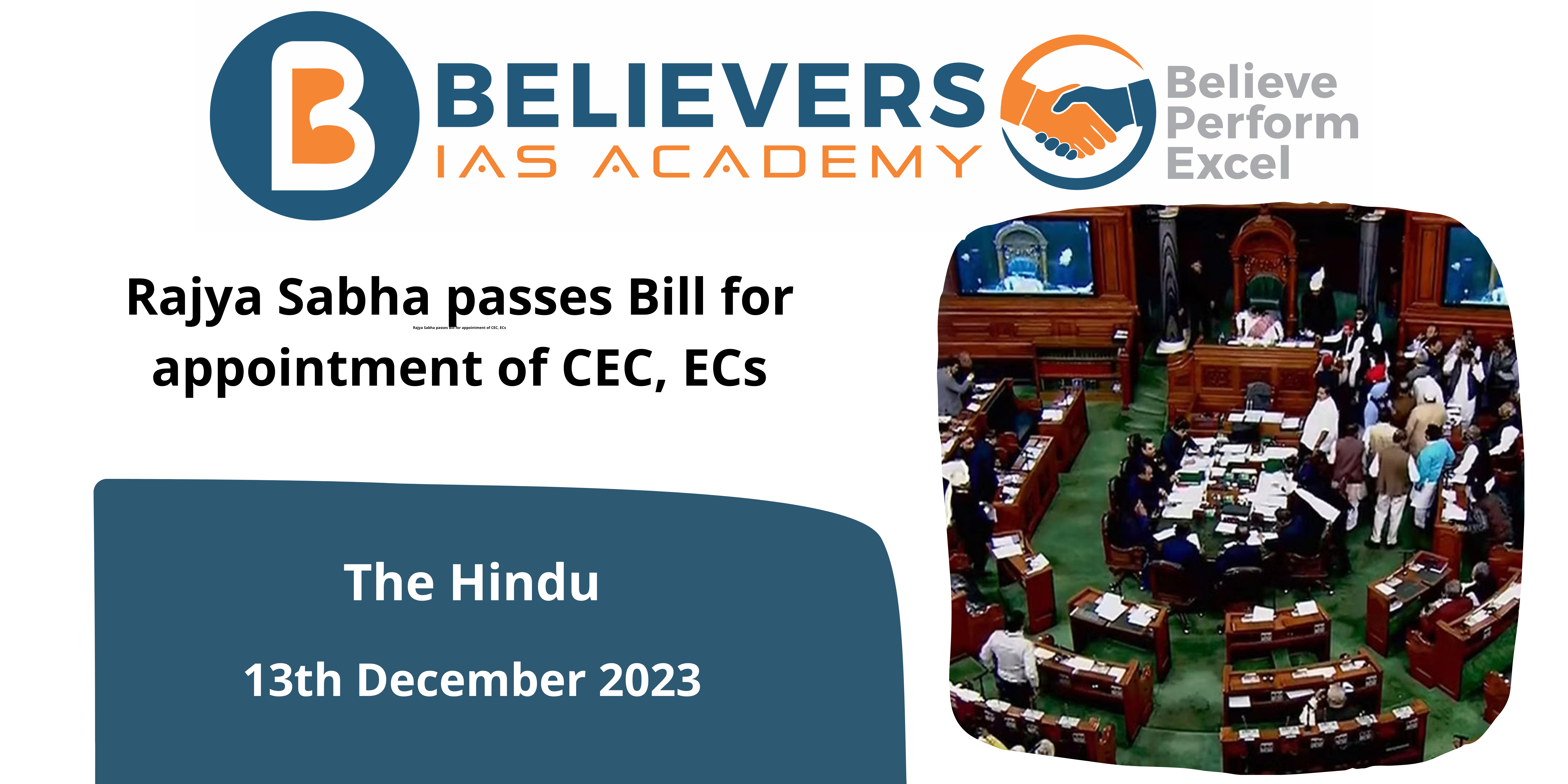Rajya Sabha passes Bill for appointment of CEC, ECs
Context:
The Chief Election Commissioner and Other Election Commissioners (Appointment, Conditions of Service and Term of Office) Bill, 2023 was passed by the Rajya Sabha.
Relevance:
GS-02 (Constitutional Bodies)
Background:
- The apex court was previously approached with petitions seeking a collegium-like system to appoint the Chief Election Commissioner and Election Commissioners.
- Accordingly, the Supreme Court directed the government to set up a panel including the Prime Minister, the Chief Justice of India, and the Opposition leader for the appointment of the country’s key election officers.
- Recently in March 2023, the Supreme Court ruled that CECs and EC’s will be appointed by the President of India on the advice of a Committee consisting of the Prime Minister and the Leader of Opposition in the Lok Sabha and the Chief Justice of India until a law is enacted by parliament on their appointments.
Key Features of the Bill:
- The bill regulates the appointment, conditions of service, and term of office for the Chief Election Commissioner (CEC) and other Election Commissioners (EC).
- It replaces the Election Commission (Conditions of Service of Election Commissioners and Transaction of Business) Act, 1991.
- Composition of the Selection Committee:
- Chairperson: Prime Minister
- Member: Leader of the Opposition in Lok Sabha (or leader of the largest opposition party if no recognized Leader of Opposition)
- Member: Union Cabinet Minister nominated by the Prime Minister
- The Bill also proposes the setting up of a Search Committee to prepare the panel of five persons for the consideration for the positions of CECs and EC:
- Headed by the Cabinet Secretary
- Two members not below the rank of Secretary with expertise in election-related matters
- Appointments of CEC and other ECs remain valid despite vacancies or defects in the Selection Committee’s constitution.
- The bill provides that the salary, allowance, and service conditions of CEC and ECs will be aligned with those of the Cabinet Secretary, distinct from the 1991 Act’s provisions where the salary of ECs was equal to that of a Supreme Court judge.
Concerns with the proposed amendments:
- Potential Executive Interference: The Bill raise concerns about the potential for executive interference in the appointment process. The Opposition contends that the legislation, by vesting significant powers in a search-and-selection committee, may expose the Election Commission to undue influence from the ruling government. This could compromise the independence of the Commission, a critical element in ensuring free and fair elections.
- Constitutional Violations: Critics argue that the amendments may violate constitutional principles, particularly those related to the independence of constitutional bodies. The Opposition, asserts that the Bill negates the judgment of the Supreme Court and undermines the autonomy of the Election Commission. Such constitutional concerns may lead to legal challenges, creating uncertainties about the legitimacy of the amended framework.
- Perceived Lack of Transparency: While the government claims that the amendments bring transparency to the appointment process, critics argue that certain aspects remain opaque. The manner in which the search-and-selection committee operates, the criteria for appointing members, and the potential for political considerations in the decision-making process are areas where the proposed amendments may lack clarity. This perceived lack of transparency can erode public trust in the electoral process and the institutions overseeing it.
Role of the Election Commissioners:
Establishment of Election Commission:
- In 1950, the Election Commission of India was established to uphold the principles of free and fair elections.
- Comprising a Chief Election Commissioner(Chairman) and other members, the commission’s size is determined by the President.
Conducting Free and Fair Elections:
- Article 324 of the Constitution grants the Election Commission the authority over the superintendence, direction, and control of elections at various levels.
- Ensures fair play through the enforcement of the Model Code of Conduct, setting guidelines for political parties and candidates.
Responsibilities Regarding Political Parties:
- Grants recognition to political parties and assigns election symbols.
- Acts as a dispute resolution authority for conflicts related to party recognition and symbol allotment.
Voter Education Initiatives:
- Conducts programs to educate voters on their rights, responsibilities, and the significance of voting.
- Aims to enhance awareness on the voting process and its importance.
Monitoring Election Expenditure:
- Ensures compliance with legal expenditure limits by monitoring the spending of political parties and candidates during elections.
Addressing Electoral Malpractices:
- Takes stringent actions against electoral malpractices such as booth capturing, bogus voting, and voter intimidation.
- Strives to maintain the integrity and fairness of the electoral process.




